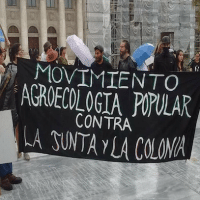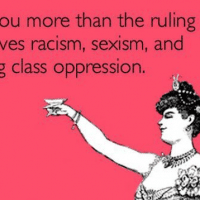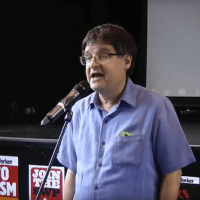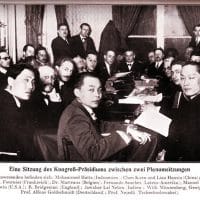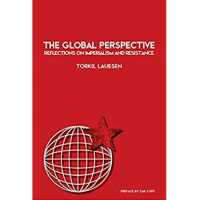-
“We need new revolutionary tools to advance the struggle of the working class”
To this day, “NUMSA has not deviated from its perspective of Marxism, Leninism and its goal of building a socialist South Africa,” says Karl Cloete
-
Democratic Party politics 101 with Alexandria Ocasio-Cortez and the corporate media
Some who read my writing may ask, “why don’t you criticize the Republicans as much as you do the Democrats?” My response to such a question is that it should be obvious by now which of the two corporate parties currently holds the Black polity and working class “constituencies” generally in a state of political captivity.
-
A nasty witch and apes—not from Oz
Even little victories are rare in the East German industrial landscape. But it is always worthwhile to oppose evil witches and even defy autocrats wearing golden caps full of diamonds and rubies.
-
Agroecology in Puerto Rico
The movement for people’s agroecology seeks to empower the peasantry of the island through encouraging collectivism and cooperatives.
-
Deepening our understanding of social reproduction theory
When we embarked on our project to explore Social Reproduction Theory (SRT), at the back of our mind was the phrase from the Marx and Engels’ German Ideology, ‘[human beings] must be in a position to live in order to be able to ‘make history’’.
-
Disappearing poverty
In international human rights law, a “forced disappearance” occurs when a person is secretly abducted or imprisoned by a state or political organization (or by a third party with the authorization, support, or acquiescence of a state or political organization), followed by a refusal to acknowledge the person’s fate and whereabouts, with the intent of placing the victim outside the protection of the law.
-
It’s been over a year since MSNBC has mentioned U.S. war in Yemen
Why is the No. 1 outlet of alleged anti-Trump #resistance completely ignoring his most devastating war?
-
UK police to arrest Julian Assange
Britain is doing Washington’s dirty work and given the heavily increased ‘political chatter’ on Assange’s fate–it is quite likely the British government is looking for public reaction to be muted enough to simply arrest him, go through the motions and send Assange to certain solitary confinement on death row.
-
What’s really happening in Nicaragua?
Violent protests have been going on since April of this year, forcing residents to stay indoors. While the corporate media and an army of online trolls have been making false claims about the Ortega government, the reality is exactly the opposite.
-
Correcting the record: what is really happening in Nicaragua?
There is a great deal of false and inaccurate information about Nicaragua in the media. Even on the left, some have simply repeated the dubious claims of CNN and Nicaragua’s oligarchic media to support the removal of President Ortega. The narrative of nonviolent protesters versus anti-riot squads and pro-government paramilitaries has not been questioned by international media.
-
Russiagate is a ruling class diversion
So this is what we can look forward to in the long twilight of a shrinking U.S. empire: the shrieks of a delirious ruling class, concocting endless diversions from the central reality of late-stage capitalism’s inability to offer the people anything but widening wars and deepening austerity.
-
Against reductionism: Marxism and oppression
The relationship between oppression and class has always been an important question for Marxists and has been the subject of numerous debates between socialists and among the left more broadly.
-
Marxian theory & eco-revolution – Prof. John Bellamy Foster
The Marxism 2018 festival, hosted by the Socialist Workers Party (SWP), took place last week in a context of deepening political polarisation across the world.
-
Trump kills science: nature strikes back
The Trump administration’s every move is marked with a strange creepiness as well as confusing messages that can only mean: They don’t get it. Their nefarious “destroy science” mentality promotes insane irreversible carbon emissions in good ole America, ultimately threatening the abilities of farmers to cope with ruinous global heat.
-
The League Against Imperialism (1927-37): An early attempt at global anti-colonial unity
The League Against Imperialism was launched in Brussels in 1927 with the goal of forging unity between colonized peoples and workers in the colonizing countries. Initiated by a wing of the Communist International, it was the first attempt to structure international anti-colonial unity. This brief presentation will focus on its origins and the causes of its decline.
-
The narrative is still Lula
He has been condemned to this cell in Curitiba by a judicial process that has his supporters outraged and his detractors gleeful. A week ago, judges went back and forth over whether he could be released while he appealed a verdict on a corruption case known as Operation Car Wash.
-
Ocasio-Cortez hedges criticisms of Israel– ‘I may not use the right words’
Rising Democratic star Alexandria Ocasio-Cortez, the congressperson-to-be for a district in the Bronx and Queens, famously tweeted “This is a massacre,” after Israel’s slaughter of 60 Gazans on May 14, and said Democrats must not be silent anymore about Israeli human rights violations, and opposed the embassy move.
-
Blood, breastmilk, and dirt: Silvia Federici and feminist materialism in international law (Part 2)
While a rich and engaging tradition of feminist approaches to international law has emerged over the past few decades, it has shown a marked tendency to sideline the long and multifaceted tradition of feminist historical-materialist thought.
-
Anti-imperialist comeback: an interview with Torkil Lauesen
Torkil Lauesen is a Danish antiimperialist whose book The Global Perspective: Reflections on Imperialism and Resistance has recently been published by Kersplebedeb.
-
Nicaragua is now the target
U.S. organizations like the National Endowment for Democracy and USAID have meddled in other countries’ affairs since their founding at the height of the Cold War.




